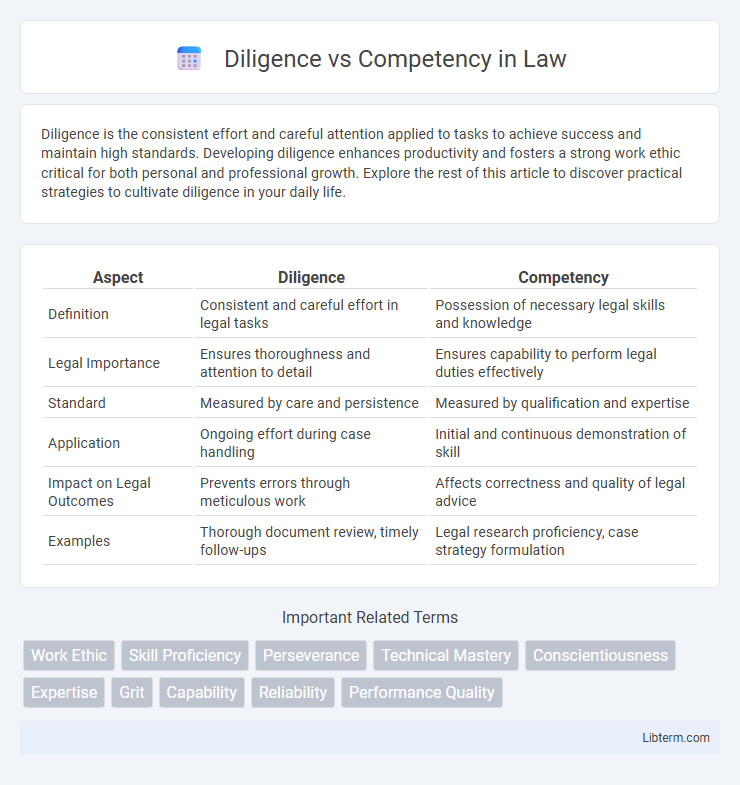Diligence is the consistent effort and careful attention applied to tasks to achieve success and maintain high standards. Developing diligence enhances productivity and fosters a strong work ethic critical for both personal and professional growth. Explore the rest of this article to discover practical strategies to cultivate diligence in your daily life.
Table of Comparison
| Aspect | Diligence | Competency |
|---|---|---|
| Definition | Consistent and careful effort in legal tasks | Possession of necessary legal skills and knowledge |
| Legal Importance | Ensures thoroughness and attention to detail | Ensures capability to perform legal duties effectively |
| Standard | Measured by care and persistence | Measured by qualification and expertise |
| Application | Ongoing effort during case handling | Initial and continuous demonstration of skill |
| Impact on Legal Outcomes | Prevents errors through meticulous work | Affects correctness and quality of legal advice |
| Examples | Thorough document review, timely follow-ups | Legal research proficiency, case strategy formulation |
Understanding Diligence: Definition and Importance
Diligence refers to the consistent and careful effort applied to tasks, ensuring accuracy and thoroughness in all actions. It plays a crucial role in achieving high performance by minimizing errors, enhancing reliability, and building trust in professional and personal settings. Understanding diligence is essential for fostering discipline, accountability, and sustained success across various fields.
What is Competency? Key Elements Explained
Competency refers to the measurable or observable knowledge, skills, abilities, and behaviors required to perform a specific job effectively. Key elements include technical expertise, problem-solving capabilities, communication skills, and adaptability, which together ensure consistent performance and successful task completion. Understanding competency helps organizations align employee capabilities with role requirements, driving productivity and professional growth.
Diligence vs Competency: Core Differences
Diligence refers to the persistent and careful effort applied to tasks, emphasizing consistency and attention to detail, while competency denotes the possession of the necessary skills, knowledge, and ability to perform effectively. Core differences lie in diligence as a behavioral trait impacting work ethic, whereas competency is an attribute reflecting qualifications and expertise. Understanding the distinction helps organizations balance skill development with fostering a strong work mindset for optimal performance.
The Role of Diligence in Achieving Success
Diligence directly impacts success by fostering consistent effort, attention to detail, and perseverance, which are crucial for overcoming challenges and achieving goals. Unlike competency, which refers to skills and knowledge, diligence ensures that these abilities are applied effectively through sustained work ethic and discipline. Studies indicate that high levels of diligence often correlate with improved performance and long-term achievement in various professional and academic fields.
How Competency Drives Performance
Competency directly impacts performance by equipping individuals with the essential skills, knowledge, and behaviors required to execute tasks efficiently and effectively. Unlike diligence, which emphasizes effort and persistence, competency ensures that efforts are strategically aligned with industry standards and organizational goals, leading to higher quality outcomes. Organizations that prioritize competency development witness improved productivity, innovation, and competitive advantage in their workforce.
When Diligence Outweighs Competency
When tackling complex projects or navigating unfamiliar challenges, diligence often outweighs competency by ensuring consistent effort and attention to detail. Persistent work ethic enables individuals to overcome gaps in expertise through continuous learning and adaptation. Employers frequently value diligence as it drives progress and reliability, even when technical skills are still developing.
The Limits of Competency Without Diligence
Competency alone cannot guarantee success without diligence, as skill sets must be consistently applied and refined through persistent effort and attention to detail. The absence of diligence can lead to stagnation, errors, and missed opportunities despite possessing strong knowledge or abilities. Effective performance relies on the synergy between established competencies and the ongoing commitment to thoroughness and perseverance.
Balancing Diligence and Competency for Optimal Results
Balancing diligence and competency is essential for achieving optimal results in any professional setting. While diligence ensures consistent effort and attention to detail, competency provides the necessary skills and knowledge to execute tasks effectively. Integrating both qualities enhances productivity, fosters quality outcomes, and supports continuous improvement within teams and organizations.
Practical Scenarios: Which Matters More?
In practical scenarios, diligence often translates to consistent effort and attention to detail, ensuring tasks are completed accurately and on time. Competency provides the necessary skills and knowledge to perform tasks effectively, but without diligence, even skilled individuals may miss deadlines or overlook critical steps. Therefore, a balanced combination of both diligence and competency usually leads to the most successful outcomes in real-world applications.
Cultivating Both Diligence and Competency in Professional Life
Cultivating both diligence and competency in professional life enhances productivity and expertise, ensuring high-quality outcomes and consistent improvement. Diligence drives perseverance and attention to detail, while competency provides the necessary skills and knowledge to perform tasks efficiently. Balancing these traits fosters career growth, adaptability, and sustained success in competitive work environments.
Diligence Infographic

 libterm.com
libterm.com